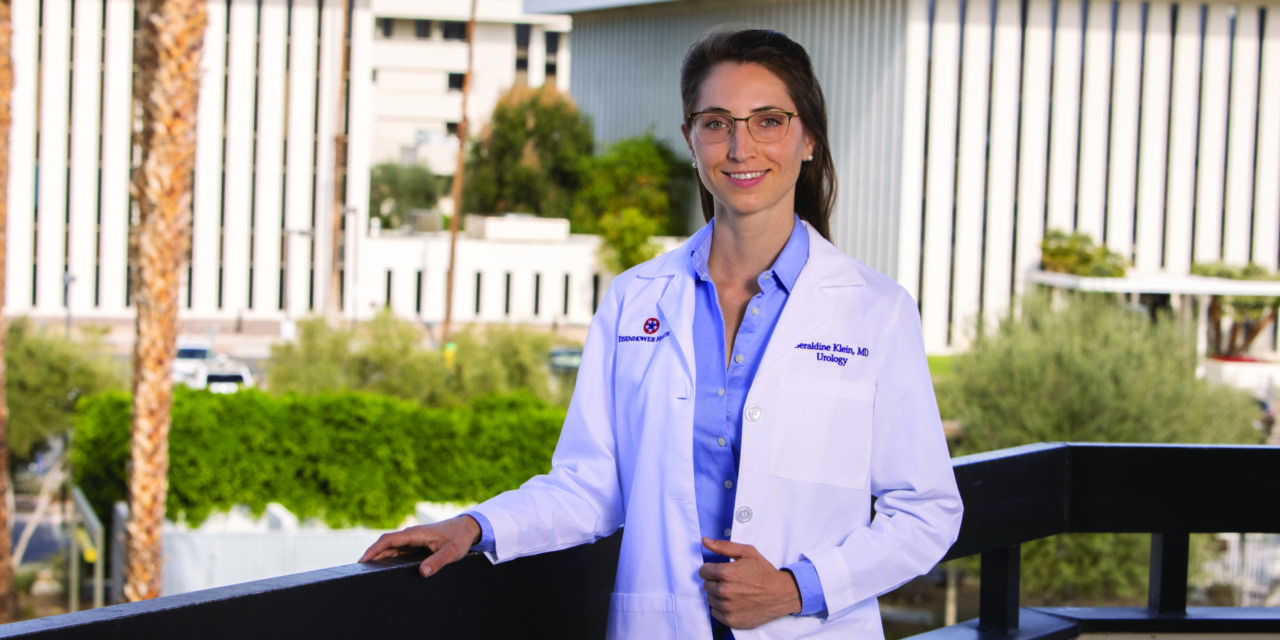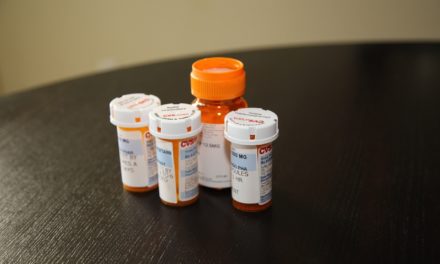New Eisenhower Urologist Brings a Wealth of Expertise; Desert’s first female urologist provides care for men and women
A female urologist is relatively uncommon. Of the estimated 13,000 urologists practicing in the United States, only about 10 percent are women. When Geraldine Klein, MD, joined Eisenhower Health in September 2020, she became the first and only such specialist in the entire Coachella Valley.
What drew her to this male-dominated specialty?
“I always knew I wanted to be in the surgical field,” she says. “Both my parents are physicians, so I was exposed to medicine from a young age. But within surgery, there aren’t many options beyond general surgery, orthopedics and ear, nose and throat. I wanted something with more breadth, and that led me to urology.
“We do laparoscopic, robotic and open surgery,” she continues. “Some are huge operations for patients who have tumor thrombus into the vena cava (a tumor that extends into the large vein that carries blood to the heart from other areas of the body). We also operate on the adrenal gland. And we do purely endoscopic procedures with no incisions, accessing parts of the body through existing openings — such as removing kidney stones through the urethra without using any kind of scalpel. It’s a huge variety.”
Dr. Klein’s broad capabilities are grounded in her extensive training. After growing up in Germany and doing her undergraduate studies at the University of St. Andrews in Scotland, she earned her medical degree from the School of Health Sciences at the University of Manchester, England, graduating with distinction. Then, she did research in Boston, going on to complete her urology residency at University of Texas Health Science Center at San Antonio, Texas. Next, she went to UT MD Anderson Cancer Center in Houston for a fellowship in reconstructive urology with a focus on robotics, which she says is “really the future for urologic surgery.”
Despite lingering perceptions to the contrary, a urologist treats both men and women for a variety of urinary tract- and kidney-related health issues, offering both surgical and nonsurgical treatment options.
“While I deal with a lot of oncology, particularly prostate cancer in men, I also work with patients who have quality-of-life issues such as incontinence, overactive bladder and erectile dysfunction — conditions for which people often don’t know there are both surgical and non-surgical treatment options available. These are areas in which urology can have a tremendous impact on well-being.”
She is passionate about helping patients understand their options for treating these types of conditions. “Current treatment for some conditions such as prostate cancer is very complex and requires significant counseling to allow patients to make the decision that is best for them,” she notes.
“Urinary incontinence in women, for example, is quite common but it’s not something that patients should simply live with and accept as a normal part of aging,” she states. “It can have a significant impact on a woman’s quality of life, making her reluctant to leave the house because she feels uncomfortable in public. We can often help her, and it doesn’t always involve surgery.”
Some of the factors contributing to urinary incontinence include pelvic organ prolapse and overactive bladder, conditions for which there are a variety of medications, lifestyle modifications, technological advances such as neuromodulation, pessaries (a pessary is a small device made of silicone, often shaped like a diaphragm, that’s inserted into the vagina to help support pelvic organs) and surgical interventions.
Similarly, she notes, erectile dysfunction (ED), while extremely common as men age, is also highly treatable — and there are various treatment options beyond just the proverbial little blue pill.
“By age 40, 40 percent of men have ED, and at 50, about 50 percent of men experience ED,” Dr. Klein says, noting that the incidence goes up each decade by about ten percent. “It often occurs along with other health issues like diabetes or cardiovascular disease. So when we see ED, it should trigger a prompt workup for preventable causes that would affect the patient’s general health, and for which there is treatment.
“I’ve treated patients with ED in their forties and those in their eighties,” she continues. “Everyone is different; some are interested in treatment while others are not. But it’s just incredibly important to recognize ED as a treatable condition that affects other aspects of a man’s life, including his confidence and interpersonal relationships. It has also been linked to depression.
“There are very few cases of ED that we can’t offer treatment for,” she stresses. “We have medications and we can also do prosthetic surgery in which we implant a penile prosthesis and a tiny pump in the scrotum. Fluid is cycled from a reservoir into two cylinders, then the prosthesis can be fully inflated and deflated. No one would know the man had had surgery.
“This is outpatient surgery that’s highly effective, with patient and partner satisfaction reported in the 80 to 90 percent range,” she adds.
Dr. Klein also notes, “Patients who bring their partner to the appointment to discuss ED treatment options are the happiest in the long run.”
Another condition she sees in men as they age is benign prostatic hyperplasia (BPH), also called prostate gland enlargement, which can cause a weak urine stream, the need to get up frequently at night to urinate, urinary urgency and a post-voiding dribble.
“We often try less-invasive things first, like medication, to treat BPH,” she says. “But if it doesn’t work or stops working, we can move to surgery and often get the patient off medication.”
With Dr. Klein’s advanced training, she also sees urologic malignancies, including prostate and kidney cancer. Her skills as a surgeon, particularly with the da Vinci® surgical robot, enable her to offer patients minimally invasive approaches that yield smaller incisions, less blood loss, lower infection risk and faster recovery than traditional open surgery.
“The robot allows us to have 360-degree wrist motion in a tiny, tight space, especially around the prostate, and it functions as a microscope, magnifying what we see, enabling tremendous precision,” she says.
She also points out that many urologic surgery cases can be performed on an outpatient basis.
“These are performed at Eisenhower Health’s outpatient surgery center, and all our patients are tested for COVID-19 and quarantined until surgery,” she says. “The risk is very low and, at this point, there’s no need to delay surgery. It’s safe to proceed.”
Being a female in a male-dominated specialty that treats mostly men begs the question: Are male patients reluctant to see her?
“I’ve only had one patient in my entire career who didn’t want a female urologist,” she says. “Even during my training, lots of times patients wouldn’t know beforehand that they were being seen by a woman, and I never had an issue.”
Conversely, she hopes that more women become aware that urology is a specialty that can help them, too.
“A lot of women may not know the role of a urologist or they’re uncomfortable seeing a male urologist but thought that was their only option,” Dr. Klein says. “I hope my presence in the desert can change that.”
Most importantly, she wants patients of both sexes who have been suffering with urologic conditions like incontinence or ED to know that there are treatment options available to them.
“These conditions can have such an impact on someone’s quality of life,” she says. “We can help relieve their symptoms and make their quality of life better.”
For more information or to make an appointment with the Eisenhower Urology Specialty Clinic, call 760.346.8555.
Image Sources
- Geraldine Klein, MD,: Ethan Kaminsky





![Enrolling Now, Rewarding Careers Ahead [Sponsored]](https://ukenreport.com/wp-content/uploads/2024/04/COD_heroes_1-1385-2-440x264.jpg)

